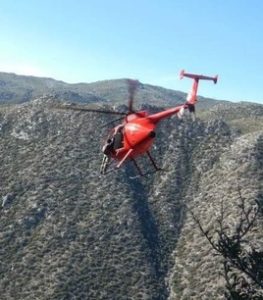A Thank You Letter from a Helicopter Pilot
 Did you know that much of the conservation work that takes place on Kauai would be impossible without helicopters?
Did you know that much of the conservation work that takes place on Kauai would be impossible without helicopters?
The remote rugged terrain restricts the amount of gear than can be packed in. Conservationists like those that work for the Kauai Forest Bird Recovery Project need gear, food, and supplies to complete their work. They must hike for many miles along steep, uneven, and unmarked trails to get to field camps and conservation areas. It would be nearly impossible to get all the scientists and their gear to these locations without helicopters. While we often thank our pilot for delivery and return, it was quite a treat to get a thank you from this helicopter pilot who makes our work possible.
If you want to learn more about the use of helicopters in conservation, check out this presentation on using helicopters for conservation on Kauai.
A Thank You Letter
I’m a helicopter pilot who flies the various conservation crews all over the island of Kauai. I get a lot of “thank you-s” while flying this rugged group about the island. When dropping them off at their remote campsites so they can get to the work they are so passionate about, I hear, “Thanks for lift!” When extracting these crews, after they have been clawing through the mud, sleeping in wet tents, and living off cold cans of Spaghetti O’s, I hear, “Thanks for getting us out of the field.” My reply to their gratitude is always the same, “My pleasure, I have the easiest job out of any of you guys”.
The flying may be easier and more comfortable than working and camping in the wettest places on the planet, but it is by no means easy flying. I may have cut my teeth in other types of heli ops, but flying conservation in Hawaii has sharpened them to a fine point. It’s experiences such as tow-in landings over 1000 foot waterfalls while certain botanists climb the exposed skids to safety. It seems evolution would see to it that rare plants only grow in places even helicopters have trouble getting to. Also, situations like slinging ungulate-proof fences high atop the ridges of the Napali Coast, where it’s either windy or really dam windy. And then, there’s the weather, the ever dynamic weather. The visibility can change just as fast as the wind blows, which leaves little time for mistakes. This is by far the most challenging part of my job. But even when the weather takes a turn for the worse, and we have to leave crews in the field, I still hear “Thank you for trying.”
Despite all the hair raising challenges I face while flying conservation crews around, it is my favorite part of the job. I’m honored to be a part of this hearty group of people who are well educated, well informed, and so passionate about the work they do. These crews are literally knee deep in protecting our native forests and animals. They give their sweat and blood for the cause. After a tough week in the field, I listen to the trials and tribulations these crews face. Sometimes I’ll say, “Well, that’s why you guys get the big bucks.” One soldier of conservation replied to that quip with, “Ya right, we get paid in sunrises and sunsets.” And that is absolutely true. You are rich. Rich in experiences in nature, and rich in seeing sites so few are ever graced with, and rich with doing work that fulfills the soul.
So with that, it’s my turn to say “Thank you.” Thank you for hiking miles and miles to collect rare seeds. Thank you for diving head first into shearwater burrows to check on the chicks. Thank you for pounding fence posts until your hands bleed. Thank you for climbing 40-foot extension ladders suspended only by ropes to ever so gently collect endangered forest bird eggs. Thank you for the fence checks, the cat hunting, the bird strike counting, the weeding of invasives and the protection of the natives. Thank you for finding work you are passionate about and sticking with it, even in the sometimes harsh conditions of the native Hawaiian forests.
I’m sure that if the citizens of Hawaii could share my birds eye view, and see what happens out there on the front lines of conservation, they would share my respect and gratitude for these crews. I hope to continue to help out with this ever so important cause. And, as long as the weather cooperates, I’ll try to get you home in time for happy hour.
Sincerely. Chris Currier. Airborne Aviation



